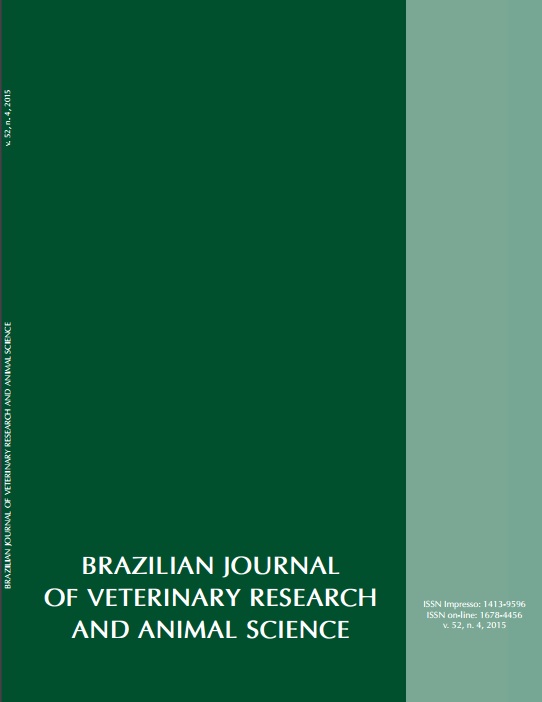Effect of dietary supplementation with oils of copaíba (Copaifera langsdorffii) and sucupira (Pterodon emarginatus): lipid oxidation of egg yolks stored in different temperatures
DOI:
https://doi.org/10.11606/issn.1678-4456.v52i4p325-332Keywords:
Antioxidants, Vegetable oil, Eggs, Laying hens, TBARSAbstract
The aim of this study was to evaluate the antioxidant effect of dietary supplementation of plant oil resins in laying hens on the oxidative stability of cooked egg yolk kept at 4ºC for 30 days, and fresh eggs stored under refrigeration (R) at the same temperature for 60 days or kept in room temperature (RT) for 30 days. Hens were fed corn- and soybean-based diets (15% CP and 2,900 kcal kg-1) and supplemented with two levels of Copaifera langsdorffii oil resin (CP-0.03; 0.06 and 0.09%) or Pterodon emarginatus oil resin (SC-0.03 and 0.06%), plus a negative control (CN). At 37 weeks of age, 667 eggs were collected and randomly distributed in different storage conditions, in natura or cooked. The progression of lipid oxidation of egg yolk in natura was quantified in quadruplicate and cooked egg yolks in duplicate, using pool of 3 egg yolks/treatment to analyze TBARS (thiobarbituric acid reactive substances) concentration in quadruplicate. Data analysis was performed using a mixed model and Tukey test, at a 5% significance level. The storage period was considered a longitudinal factor, which varied from five times, for R cooked yolk and TA fresh yolk (0-30 days), to nine times, for R fresh yolk (0-60 days). For fresh eggs stored at RT or R, the supplementation of plant oils did not protect egg yolks from lipid oxidation, compared to NC. However, for cooked egg yolks, the addition of 0.03 and 0.06% of CP oil resin showed antioxidant activity since it reduced lipid oxidation up to day 21 of storage, but had a prooxidant effect for 0.09%. Therefore, it can be concluded that the supplementation of copaíba oil resin had an antioxidant protection of cooked egg lipids.Downloads
Download data is not yet available.
Downloads
Published
2015-12-10
Issue
Section
ARTICLES
License
The journal content is authorized under the Creative Commons BY-NC-SA license (summary of the license: https://
How to Cite
1.
Oliveira GR de, Racanicci AMC, Tanure CBGS, Lima CB de, Souza TC de, Migotto DL, et al. Effect of dietary supplementation with oils of copaíba (Copaifera langsdorffii) and sucupira (Pterodon emarginatus): lipid oxidation of egg yolks stored in different temperatures. Braz. J. Vet. Res. Anim. Sci. [Internet]. 2015 Dec. 10 [cited 2024 Apr. 26];52(4):325-32. Available from: https://revistas.usp.br/bjvras/article/view/83409





